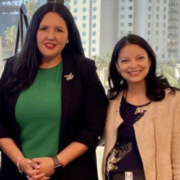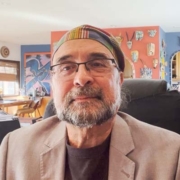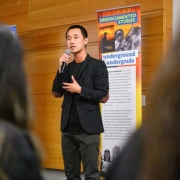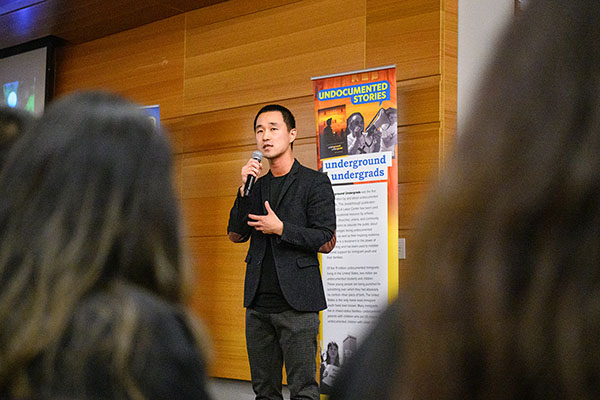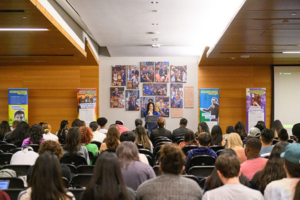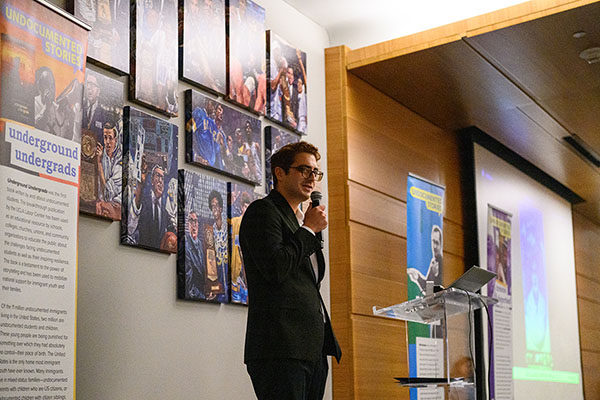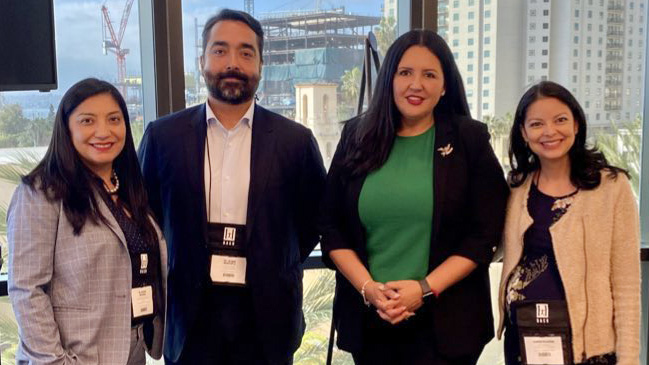
(From left) Dr. Rosita Ramirez of NALEO, Dr. Angel Molina of ASU CLAPR, Supervisor Nora Vargas and Juana Sánchez of UCLA LPPI at the HACU Annual Conference
The Role of Hispanic Serving Institutions in Preparing the Leaders of Tomorrow
By Alise Brillault
As one of the youngest and fastest-growing demographic groups in the United States, Latinos are key to the future success of our nation and represent the leaders of today and tomorrow. The 2022 midterm elections saw a record number of Latinos elected to Congress, including the country’s first Gen-Z congressperson. Likewise, young Latinos are increasingly shaping election outcomes, driving record turnout around the salient issues that matter most to them. To truly harness the power of this next generation of changemakers, however, Latinos must have access to the high-quality postsecondary education necessary to bolster their full civic and economic participation.
Hispanic Serving Institutions (HSIs), which are federally designated as having at least 25% Latino/Hispanic undergraduate student enrollment, are essential in preparing the future leadership of this country. UCLA is striving towards achieving HSI status, backed by the support of on-campus units like the UCLA Latino Policy and Politics Institute (UCLA LPPI).
As such, UCLA LPPI’s director of programs, Juana Hernandez Sánchez, led a panel at last month’s Hispanic Association of Colleges and Universities (HACU) conference. Held from October 28-30 in San Diego, the conference drew education administrators, government agency staff, corporate leaders and community partners interested in supporting Latino university students through HSI status and beyond.
In her panel, Sánchez was joined by San Diego County Supervisor Nora Vargas as well as UCLA LPPI partners Dr. Angel Molina from the Center for Latina/os and American Politics Research at Arizona State University (ASU CLAPR) and Dr. Rosita Ramirez of the National Association of Latino Elected and Appointed Officials (NALEO). Their discussion centered on the role that Hispanic Serving Research Institutions (HSRIs) play in leveraging rigorous research to inform live public policy debates that impact economic mobility, educational opportunity and quality of life for Latino communities in the U.S. In particular, Sánchez and Dr. Molina discussed how their respective research centers are working to advance equitable, data-informed policymaking and governance while training and supporting Latino students.
“Through our Policy Fellowship at UCLA LPPI, we are contributing to campus-wide efforts to train undergraduates in research, strengthen the graduate education pipeline and promote the retention and success of our Latinx graduate students,” Sánchez explained.
“The research is clear that with more education, individuals experience higher earnings, better quality jobs, higher rates of civic participation and other positive life outcomes,” she elaborated. “Thus, obtaining a postsecondary education is not only vital for individuals’ upward socioeconomic mobility and for U.S. economic prosperity, but also to increase civic participation levels and strengthen our democracy.”
While Latino undergraduates overwhelmingly tend to enroll in HSIs in pursuit of this educational training, Dr. Molina emphasized the need to go beyond enrollment counts to support historically excluded students.
“In order to better prepare the Latino students who will make up the future electorate, public servants and policymakers, HSIs really need to focus on the ‘S’ (‘Serving’) in ‘HSI,’” Dr. Molina said. “For places like ASU, which is a relatively new HSI, and UCLA, which aspires to become an HSI, HACU was a great opportunity for us to learn from the universities who have been doing this work for a long time. They were able to share their insights about what it means to serve students and how they are innovating as the demographic itself is changing.”
Nationally, there are just 21 Hispanic Serving Research Institutes. As one of the highest-ranked research universities in the world, UCLA has the opportunity to orient its teaching and research agendas to better serve Latino communities and learn from peer institutions like ASU. Providing Latino students with access to high-quality research education that explicitly serves their needs will help prepare them to tackle the challenges of today and tomorrow. The future prosperity of our nation depends on it.

